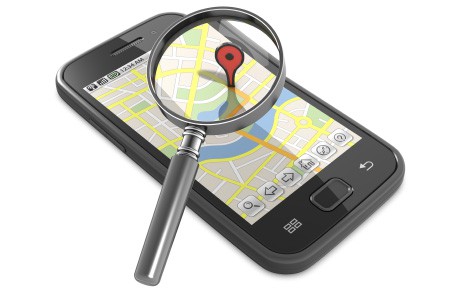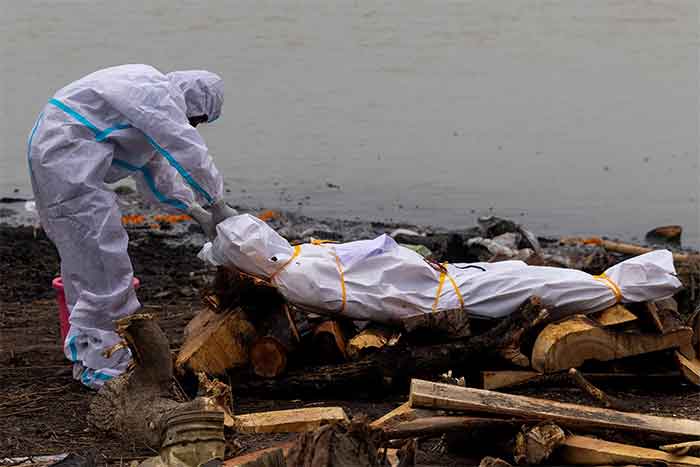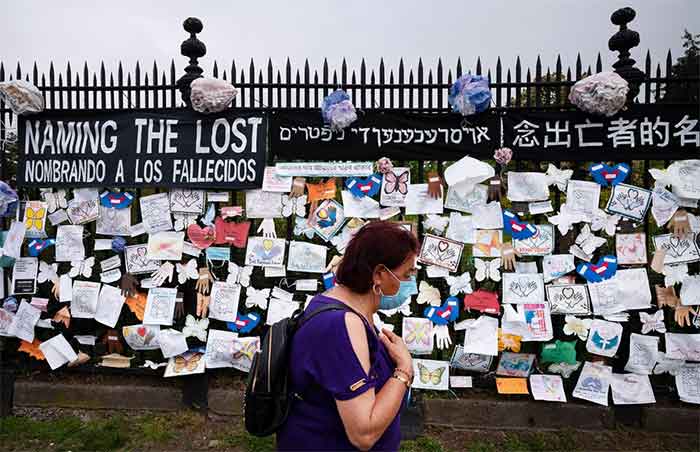
As coronavirus sweeps across the globe, governments are stepping up surveillance of their citizens.
Some countries are collecting anonymized data to study movement of people more generally, while others are providing detailed information about individuals’ movements.
Governments across the world are galvanizing every surveillance tool at their disposal to help stem the spread of the novel coronavirus.
Countries have been quick to use the one tool almost all of us carry with us — smartphones.
A new live index of ramped up security measures by Top10VPN details the countries which have already brought in measures to track the phones of coronavirus patients, ranging from anonymized aggregated data to monitor the movement of people more generally, to the tracking of individual suspected patients and their contacts, known as “contact tracing.”
The U.S. is reportedly in talks with Facebook and Google to use anonymized location data to track the spread of the disease although Mark Zuckerberg subsequently denied the news.
The UK’s top scientist has endorsed the use of contact tracing.
Samuel Woodhams, Top10VPN’s Digital Rights Lead who compiled the index, warned that the world could slide into permanently increased surveillance.
“Without adequate tracking, there is a danger that these new, often highly invasive, measures will become the norm around the world,” he told Business Insider. “Although some may appear entirely legitimate, many pose a risk to citizens’ right to privacy and freedom of expression.
“Given how quickly things are changing, documenting the new measures is the first step to challenging potential overreach, providing scrutiny and holding corporations and governments to account.”
While some countries will cap their new emergency measures, otherwise may retain the powers for future use. “There is a risk that many of these new capabilities will continue to be used following the outbreak,” said Woodhams. “This is particularly significant as many of the new measures have avoided public and political scrutiny and do not include sunset clauses.”
A list of countries now tracking phone data has been prepared.
South Korea
South Korea gives out detailed information about patients’ whereabouts.
South Korea has gone a step further than other countries, tracking individuals’ phones and creating a publicly available map to allow other citizens to check whether they may have crossed paths with any coronavirus patients.
The tracking data that goes into the map is not limited to mobile phone data, credit card records and even face-to-face interviews with patients are being used to build a retroactive map of where they have been.
Not only is the map there for citizens to check, but the South Korean government is using it to proactively send regional text messages warning people they may have come into contact with someone carrying the virus.
The location given can be extremely specific, the Washington Post reported a text went out that said an infected person had been at the “Magic Coin Karaoke in Jayang-dong at midnight on Feb. 20.”
Some texts give out more personal information however.
A text reported by The Guardian read: “A woman in her 60s has just tested positive. Click on the link for the places she visited before she was hospitalized.”
The director of the Korea Centers for Disease Control and Prevention, Jeong Eun-kyeong, acknowledged that the site infringes on civil liberties, saying: “It is true that public interests tend to be emphasized more than human rights of individuals when dealing with diseases that can infect others.”
The map is already interfering with civil liberties, as a South Korean woman told the Washington Post that she had stopped attending a bar popular with lesbians for fear of being outed. “If I unknowingly contract the virus… that record will be released to the whole country,” she said.
The system is also throwing up other unexpected challenges. The Guardian reported that one man claiming to be infected threatened various restaurants saying he would visit and hurt their custom unless they gave him money to stay away.
Iran
Iran has asked its citizens to download an invasive app.
Vice reported that Iran’s government endorsed a coronavirus diagnosis app that collected users’ real-time location data.
On March 3, a message went out to millions of Iranian citizens telling them to install the app, called AC19, before going to a hospital or health center.
The app claimed to be able to diagnose the user with coronavirus by asking a series of yes or no questions. The app has since been removed from the Google Play store.
Israel
Israel has passed new laws to spy on its citizens.
As part of a broad set of new surveillance measures approved by Prime Minister Benjamin Netanyahu on March 17, Israel’s Security Agency will no longer have to obtain a court order to track individuals’ phones. The new law also stipulates all data collected must be deleted after 30 days.
Netanyahu described the new security measures as “invasive” in an address to the nation.
“We’ll deploy measures we’ve only previously deployed against terrorists. Some of these will be invasive and infringe on the privacy of those affected. We must adopt a new routine,” said Netanyahu.
Singapore
Singapore has an app, which can trace people within 2m of infected patients.
Singapore’s Government Technology Agency and the Ministry of Health developed an app for contact tracing called TraceTogether, which launched on March 20.
Per the Straits Times, the app is used: “to identify people who have been in close proximity, within 2m for at least 30 minutes — to coronavirus patients using wireless Bluetooth technology.”
“No geolocation data or other personal data is collected,” TraceTogether said in an explanatory video.
Taiwan
Taiwan can tell when quarantined people have left the house.
Taiwan has activated what it calls an “electronic fence” that tracks mobile phone data and alerts authorities when someone who is supposed to be quarantined at home is leaving the house.
“The goal is to stop people from running around and spreading the infection,” said Jyan Hong-wei, head of Taiwan’s Department of Cyber Security. Jyan added that local authorities and police should be able to respond to anyone who triggers an alert within 15 minutes.
Austria
Austria is using anonymized data to map people’s movements.
On March 17 Austria’s biggest telecoms network operator Telekom Austria AG announced it was sharing anonymized location data with the government.
The technology being used was developed by a spin-off startup out of the University of Graz, and Telekom Austria said it is usually used to measure footfall in popular tourist sites.
Woodhams told Business Insider that while collecting aggregated data sets is less invasive than other measures, how that data could be used in future should still be cause for concern.
“Much of the data may remain at risk from re-identification, and it still provides governments with the ability to track the movement of large groups of its citizens,” said Woodhams.
Belgium
Belgium is using anonymized data from telcos.
The Belgian government gave the go-ahead on March 11 to start using anonymized data from local telecom companies.
Germany
Germany is modeling how people are moving around.
Deutsche Telekom announced on March 18 it would be sharing data with the Robert Koch Institute (Germany’s version of the CDC).
“With this we can model how people are moving around nationwide, on a state level, and even on a community level,” a spokesperson for Deutsche Telekom told Die Welt.
Italy
Italy has created movement maps.
Italy has also signed a deal with telecoms operators to collect anonymized location data.
As of March 18, Italy had charged 40,000 of its citizens with violating its lockdown laws, according to The Guardian.
The UK is not tracking yet but is considering it.
While nothing official has been announced yet, the UK is in talks with major telecom providers including O2 and EF to provide large sets of anonymized data.
The UK does not seem to be exploring the more invasive method of contact tracing. However, it is considering using aggregated data to track the wider pattern of people’s movements.
Gun sales on the rise
An ABC News report by Luke Barr said on March 21, 2020:
At gun stores from California to New York, citizens are stocking up in enormous numbers, almost as if the end was near.
“Trying to buy ammunition because of everything that’s going on with the virus and stuff, it’s horrible and I don’t want to take any chances,” Angel Colon told ABC News affiliate WPVI in Spanish.
People are arming themselves. They are lining up outside gun stores, or going online. In February, the internet retailer ammo.com reported a 309% increase in revenue and a 222% surge in transactions. The group is calling the sales “unprecedented.”
The increased gun sales come as police departments are being forced to pare down operations due to the pandemic.
Some police Departments are responding to only calls that involve emergencies like fender benders and lost items are being handled over the phone or people are required to go and give a statement at the police station.
National figures on gun sales that are monitored by the FBI will not be available until early April. But the anecdotal evidence is hard to miss.
In Virginia, where the State Police track background check numbers, there was an 86% increase in requests in January compared to January of 2019. Authorities attribute some of that uptick to Virginia’s lobby day – when gun enthusiasts descended on Richmond in opposition to proposed new restrictions.
But the trend continued in February, when over 64,000 buyers underwent checks, compared to 39,300 the previous February. And in March, Virginia saw 35,383 background checks conducted, which is just 10,000 background checks than the entire month of March 2019.
In Colorado, more than 14,000 background checks for firearms transfers have been received in the last week, compared to about 7,000 checks conducted in the same timeframe last year, the Colorado Bureau of Investigation said in a statement on Tuesday.
In Pennsylvania, police said this week that a surge in requests to the state’s background check system for firearm purchases twice resulted in the system shutting down for hours-long periods. On one day alone, March 17, the Pennsylvania Instant Check System completed 4,342 transactions. That day in 2019, they only ran 1,359 checks, according to Major Gary Dance, director of the Pennsylvania State Police Bureau of Records and Identification.
“The Pennsylvania State Police is working with its vendor to increase processing power to avoid future backlogs and will adjust staffing as needed to meet demand,” Dance said.
Across the Northeast, lines have snaked out the doors of local gun shops.
Kimber Zerweck told ABC News station WPVI in Philadelphia that lines have been out the door since Thursday.
“In five years I’ve owned this place, I’ve never had lines out the door,” said Zerweck, who owns Delia’s Gunshop in Mayfair, Pennsylvania. “It’s a mixture of people who know what they wanna buy and other people who wanna buy because they’re afraid of what’s going on with the criminal element.”
There was a similar scene in upstate New York where Peter O’Malley was on his way to his campus when he saw the crowd outside Hempstead Guns and Ammo.
“When I first saw it looked like it was just like, you know, a line of probably 10, 15 people,” O’Malley said in an interview. “And then it was probably a line of 20, 25, 30 and it wrapped all the way around the back part of the parking lot.”
Kyle Harrison, an employee at Top Gun in Houston, told ABC affiliate KTRK that customers are buying “literally everything.”
“They’re buying firearms and ammunition and accessories,” Harrison said.
SIGN UP FOR COUNTERCURRENTS DAILY NEWS LETTER

















































